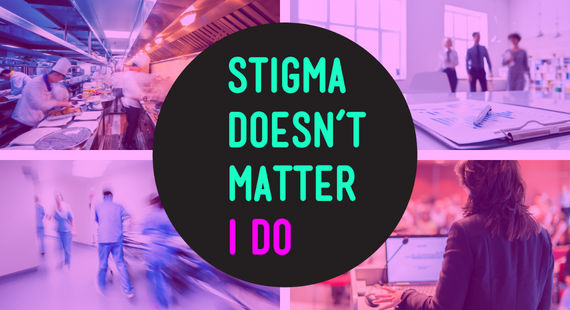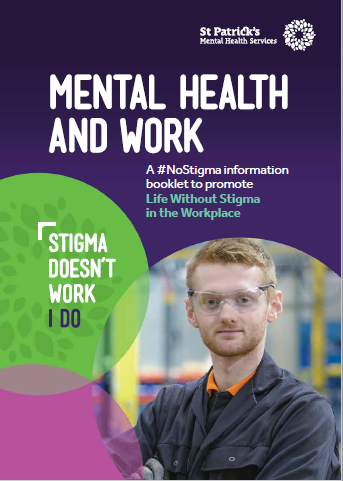
People with mental health difficulties in Ireland can still experience stigma at work; we explore how we can change this.
Stigma can arise because of lack of awareness and understanding about mental health, and it can negatively affect people’s experiences of working life. Things are improving, but people with mental health difficulties in Ireland still experience stigma and discrimination when it comes to work; this can be especially true for people with serious and enduring mental health difficulties.
Life without mental health stigma is achievable, however. Our #NoStigma campaign asks us to imagine life without stigma in the home, community and workplace, and shares information on what we can all do to make this a reality.
In this #NoStigma article, we consider:
- why we need to achieve life without stigma in the workplace
- why work can be an important part of the recovery process for many people
- what helps when it comes to work and mental health difficulties.
Stigma and discrimination at work
Every year in St Patrick’s Mental Health Services (SPMHS), we carry out a survey on stigma and attitudes to mental health. Findings from our 2022 survey showed that, while there’s been improvement, we’ve still some way to go to achieve life without stigma in the workplace.
For example:
- Just over half of people surveyed (56%) would be ok explaining to their boss if they needed time off for a mental health difficulty
- Two out of three people think that someone who experiences panic attacks could work as the head of a large company
- One in four people have had a colleague disclose a mental health difficulty to them.
In Ireland, under national law banning workplace discrimination, mental health difficulties are covered under the ground of disability. However, the Irish Human Rights and Equality Commission (IHREC) reported that, for 2022, concerns about disability-related discrimination remained the main reason for contact from the public: over a third of contacts to their Your Rights service were around disability discrimination related to employment.
Additionally, a 2021 study by the Economic and Social Research Institute (ESRI) estimated that only one-third of people with disabilities in Ireland of working age are in employment, compared with two-thirds for people without disabilities. It highlights too that there can be a severe impact on employment chances for people with “psychological or emotional conditions”. We also know that people with more severe and ongoing mental health difficulties can be at risk of being excluded from the workforce, despite having a strong desire to work.
For all these reasons, it’s crucial that we continue to work towards workplaces free from mental health stigma and discrimination.
Achieving life without stigma in the workplace
There are many ways for us to leave stigma and discrimination behind when it comes to work.
Increased awareness and understanding of mental health needs
There has been much work done in recent years to improve how mental health is understood and approached in the workplace. An example of a national stigma reduction workplace programme is the ‘SeeChange in Your Workplace’ pledge. The SeeChange website also offers resources and supports for workplaces to tackle stigma and improve mental health awareness.
Supports for people with mental health difficulties who are looking for work
There is a range of training and employment supports available for people who may have more severe or ongoing mental health difficulties and who would benefit from support in getting a job. These include supported employment services, such as the EmployAbility service, and specialist educational and training providers, such as the National Learning Network.
For people availing of community mental health services, access to an Individual Placement and Support programme may also be an option.
Supports or reasonable accommodations for people returning to work
For people returning to work after time off for mental health recovery, reasonable accommodations may be of benefit. Reasonable accommodations are changes that an employer must make to job tasks or structure, or amendments to the work environment, in order to ensure equal opportunities in the workplace.
This is an obligation under employment equality law, unless it would place a "disproportionate burden" on an employer, such as a very high financial cost. However, there are numerous grants available to employers, and many reasonable accommodations do not involve particular costs. For example, when it comes to mental health needs, time off to attend appointments or a flexible work schedule may be helpful and effective changes. You can learn more about reasonable accommodations here.
Increased awareness of, and responsiveness to, our rights to live free from discrimination
We all have the right to work without experiencing stigma and discrimination. Work without mental health stigma would mean:
- Our workplaces are inclusive and supportive environments
- We all experience equal opportunities for employment and for progressing at work
- We all get access to available support in the workplace if we need it
- We can let others know if we are struggling
- We don’t delay in looking after our mental health.
We are all also protected from mental health discrimination at work under national laws. The main employment equality law is the Employment Equality Acts 1998-2015. You can find out more about employment law from IHREC. IHREC has also produced a guide to your rights if you are discriminated against in the workplace or while seeking employment.
You can also watch our #NoStigma at Work video below to learn more about your rights in the workplace and supports available at work if you are going through a mental health difficulty.
Work and recovery
Work can be an important part of both supporting our mental health in daily life and recovering from mental health difficulties if we experience them. This is especially true when we feel safe and supported in work environments, and this goes far beyond the financial benefits that paid employment provides.
The World Health Organisation (WHO) highlights that when work is meaningful and when work conditions and environments are safe and good, it can be protective of our mental health. Importantly, work can contribute to recovery and inclusion for people living with ongoing mental health difficulties.
Research with people in recovery from mental health difficulties - such as psychosis, bipolar affective disorder and major depression - shows that work can foster pride and self-esteem, provide a helpful sense of routine, offer a sense of personal meaning and, overall, enable the process of recovery. People with experience of mental health difficulties, including severe and ongoing difficulties, have also highlighted how the experience of mental health recovery itself has helped in their work-life, by, for example, drawing them towards altruistic (caring or charitable) roles or having their personal experiences being recognised as an asset.
Personal stories of mental health at work
Here are some examples of positive experiences of #NoStigma workplaces they shared.
“I was live-in staff at a summer camp when I was in my early twenties, and felt extremely nervous about asking my superiors for an hour off once a week right in our busiest part of the day so I could go to therapy. When I asked, they didn't even hesitate, and immediately asked if there was anything else they could do to make sure my needs were being met. That simple trust meant a huge amount to me.”
“When going back to work after the lockdown, I noticed that I was increasingly falling behind. Everyone else seemed to be coping better than me. It got to a point where I had to step away during the middle of a shift to calm myself down. I talked to my boss who looked at our operations. They sent a mass email asking how everyone was doing; at that point, I realised that I was not alone.”
“Returning to work after several weeks off for an episode of depression, I was able to return to my job on a phased basis, which really helped with easing back into things. Insomnia and disturbed sleep had been a major problem for me, and my sleep was still a work in progress; I’d struggle to sleep and then fall into a deep, deep, sleep around 5am. I let my manager know this, and she was really supportive from the get-go, suggesting flexible work hours so I could start later in the morning when needed. Getting back to work in this way was really important to me and I really valued the responsive and open attitude of my boss. I didn’t have to try and ‘battle through’ with little sleep, and potentially set myself back.”
Get our #NoStigma in the Workplace booklet
Download our free information booklet which covers diverse topics relating to mental health in the workplace, such as:
- your rights and legal protections against discrimination
- disclosing a mental health difficulty
- what to do if you believe you've been discriminated against at work
- what can help with a return to work after a mental health difficulty
- guidance around reasonable acommodations
- training and job-seeking supports.
Continue to…
Exploring treatment options for eating disorders

